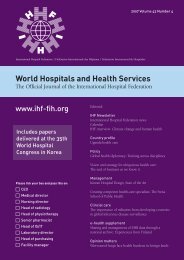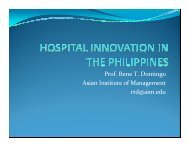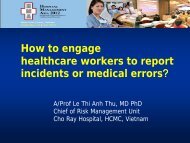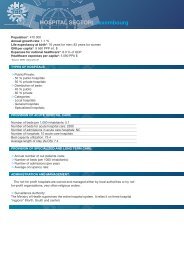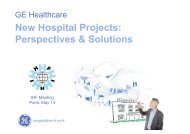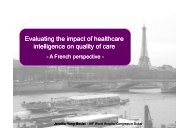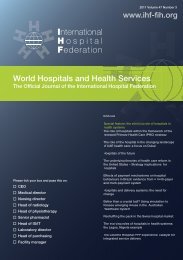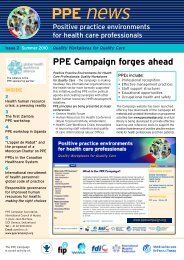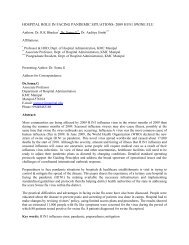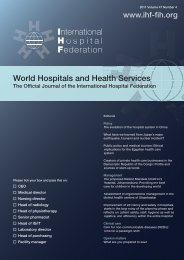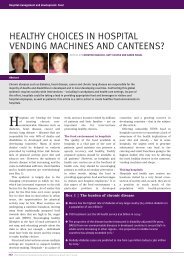World Hospitals and Health Services - International Hospital ...
World Hospitals and Health Services - International Hospital ...
World Hospitals and Health Services - International Hospital ...
You also want an ePaper? Increase the reach of your titles
YUMPU automatically turns print PDFs into web optimized ePapers that Google loves.
CLINICAL CARE: EMERGENCY SURGERY<br />
Training workshop methodology<br />
The workshop provided participants with the experience<br />
<strong>and</strong> tools for the implementation of effective education <strong>and</strong><br />
training activities. The interactive learning methods were<br />
used to train participants with a focus that that they will be<br />
able to adapt <strong>and</strong> apply a st<strong>and</strong>ardised format to their<br />
teaching programmes. Through h<strong>and</strong>s-on training, group<br />
exercises, role play, the participants were able to simulate<br />
their future training activities.<br />
This basic skills training of trainers workshop had several<br />
components with lectures, e-learning, working group<br />
discussions, role-play, <strong>and</strong> ‘h<strong>and</strong>s-on basic skills training’.<br />
The teaching focussed on improving the quality of<br />
emergency <strong>and</strong> essential surgical care at resource-limited<br />
clinical settings. The trainers were trained to teach WHO<br />
integrated management basic skills in surgery, obstetrics,<br />
trauma, anaesthesia in their training <strong>and</strong> education<br />
programmes, in particular non-specialist doctors, nurses,<br />
technicians <strong>and</strong> paramedical staff.<br />
Lectures <strong>and</strong> discussions<br />
The topics covered in lectures <strong>and</strong> discussions included the<br />
following: team responsibility <strong>and</strong> organisation of health<br />
care facilities; patient safety; disaster planning; appropriate<br />
use of oxygen; management of bleeding; burns <strong>and</strong> trauma;<br />
basic anaesthetic <strong>and</strong> resuscitation techniques; prevention<br />
of nosocomial HIV transmission; sterilisation of equipment;<br />
waste disposal; hygiene; record keeping; monitoring <strong>and</strong><br />
evaluation on quality of care, <strong>and</strong> well as checklists prior to<br />
surgery to assure that the correct patient gets the correct<br />
surgery on the correct side at the correct time.<br />
Participants discussed the applicability of the WHO<br />
integrated management package in emergency <strong>and</strong><br />
essential surgical care to become a part of the teaching<br />
curriculum for medical <strong>and</strong> nursing students, nonspecialist<br />
doctors, nurses, technicians <strong>and</strong> paramedic staff,<br />
trauma, obstetrics, surgery, anaesthesia <strong>and</strong> emergency<br />
services.<br />
E-learning <strong>and</strong> video conferencing<br />
The video conference <strong>and</strong> e-learning sessions, supported by<br />
the <strong>World</strong> Bank included lectures, presentations,<br />
discussions <strong>and</strong> training using mannequins <strong>and</strong> video link.<br />
The topics included resuscitation, trauma <strong>and</strong> bleeding.<br />
Participants used the WHO integrated basic skills training<br />
tools (e-learning <strong>and</strong> training manual Surgical Care at District<br />
<strong>Hospital</strong>) <strong>and</strong> discussed the relevance of its contents on<br />
guiding day-to-day clinical practice <strong>and</strong> in training of health<br />
personnel at all levels of care.<br />
E-learning tools were pilot-tested for training <strong>and</strong><br />
discussions with practical skills teaching done through video<br />
conference, facilitators including colleagues from<br />
WHO/RHR, WHO/EIP, <strong>and</strong> partner organisations <strong>Hospital</strong><br />
University Geneva <strong>and</strong> the Geneva Foundation of Medical<br />
Education <strong>and</strong> Research.<br />
Participants were trained in using the training tools in the<br />
teaching of basic skills to health providers <strong>and</strong> in the<br />
implementation of best practice protocols for behaviour<br />
change at resource limited clinical settings.<br />
Practical skills teaching on patient safety best practices,<br />
basic life support, intravenous access <strong>and</strong> maintenance,<br />
airway management for resuscitation <strong>and</strong> safe use of<br />
equipment (oxygen, airways), management of postpartum<br />
bleeding, discussions on interesting case studies, access to<br />
guidelines, journals <strong>and</strong> useful links for training were done<br />
through video conference. The WHO Integrated<br />
Management Package of Essential Emergency Surgical Care<br />
(an e-Learning pilot version, based on the WHO manual<br />
Surgical Care at District <strong>Hospital</strong>) was demonstrated. The<br />
participants were trained in the use of these tools for the<br />
implementation of good practice. There was agreement on<br />
the relevance of its contents on guiding day-to-day practice<br />
<strong>and</strong> it was felt that these would be a useful resource for reenforcement<br />
<strong>and</strong> further enhancement of the training of<br />
health care providers.<br />
‘H<strong>and</strong>s on’ training in hospital<br />
Part of the training sessions were conducted at the hospital,<br />
for ‘h<strong>and</strong>s on training’ on essential emergency procedures<br />
<strong>and</strong> equipment to manage trauma, prevention of HIV<br />
transmission, disaster planning, basic life support,<br />
anaesthetic equipment, h<strong>and</strong> hygiene, transportation of the<br />
critically ill, splint <strong>and</strong> plaster application <strong>and</strong> first aid. The<br />
facilitators from the University <strong>Hospital</strong> included the<br />
Mongolian Association of Surgeons linked to <strong>International</strong><br />
College of Surgeons (Swiss team). The trainers were trained<br />
in the st<strong>and</strong>ard WHO best practice protocols with ‘h<strong>and</strong>son<br />
basic skills training’ in h<strong>and</strong> washing, basic life support,<br />
safety of anaesthesia techniques, trauma, hygiene, universal<br />
precautions <strong>and</strong> prevention of HIV transmission using blood<br />
conservation, anaesthetic <strong>and</strong> surgical techniques, treatment<br />
of anaemia, since at soum <strong>and</strong> intersoums <strong>and</strong> some aimag<br />
hospitals there is no access to safe blood.<br />
Working group discussions <strong>and</strong> action plan<br />
The participants, divided into six working groups<br />
representing the six aimags, with one facilitator from the<br />
<strong>Health</strong> Science University <strong>Hospital</strong>, in Ulaanbaatar,<br />
developed an action plan for capacity-building of health<br />
facilities linked to their aimags. The following was developed<br />
by the working groups to improve the existing emergency<br />
<strong>and</strong> surgical care in the six identified aimags:<br />
➜ Conduct training on emergency <strong>and</strong> surgical care for<br />
service providers (doctors, nurses <strong>and</strong> midwives).<br />
➜ Provide basic emergency essential equipment,<br />
instruments <strong>and</strong> drugs.<br />
➜ Implement the WHO best practice intervention<br />
protocols <strong>and</strong> st<strong>and</strong>ards on emergency <strong>and</strong> essential<br />
surgical care.<br />
➜ The WHO training manual Surgical Care at the District<br />
<strong>Hospital</strong> to be translated into Mongolian, printed <strong>and</strong><br />
distributed for the emergency <strong>and</strong> surgical care<br />
providers at aimag, soum <strong>and</strong> intersoum hospitals.<br />
➜ The trainers will organise local training sessions in<br />
each of the six selected aimag using the WHO training<br />
tools.<br />
Vol. 40 No. 4 | <strong>World</strong> <strong><strong>Hospital</strong>s</strong> <strong>and</strong> <strong>Health</strong> <strong>Services</strong> | 27



